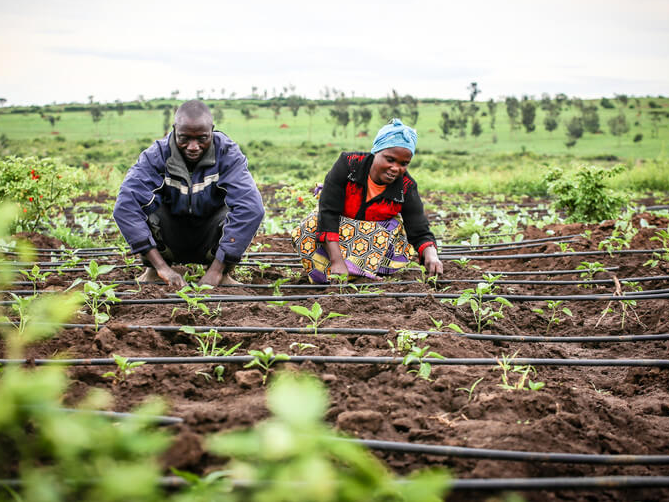Projects
Our current projects and projects of interest to us
Tap/Click on project to show/hide detailsSmart Kitchen Solutions is a relatively new company started by Nantongo Barbra Jane after going through the business accelerator program at SINA.

In Uganda, 90% of the population still uses charcoal and firewood for cooking, as the costs of electricity, and propane are prohibitive. For low and middle income households, restaurants, and schools which need an alternative cooking fuel, Smart Kitchen Solutions offers eco-friendly briquettes that are smoke free, stainless, burn longer and are cheaper than the charcoal. Smart Kitchen Solutions uses maize husks, coffee husks (which are usually agricultural waste from nearby farmers) to make their long lasting briquettes. Their innovation will help reduce carbon emissions and deforestation in Uganda, while providing low and middle income Ugandans with an affordable, smoke free healthier alternative to charcoal.


SINA transforms marginalized youth into social entrepreneurs through a cost-effective community approach.

SINA scholars are between 18 nd 27 years old and are refugees, orphans, street children, former child soldiers, former inmates, former prostitutes, or young people from other marginalized and poor backgrounds. They have dropped out of school and society has labled them as useless. Many have started to believe this label. SINA has proven that they can flourish if given responsibilities and a space to unfold. Scholars transform their own personal tragedies into a social enterprise, disrupting the rot causes of sical problems. The youth does not leave with a certificate, but instead with their own employment.
Some of the projects undertaken by graduates from SINA iUganda nclude building structures using plastic bottles, making ecofriendly straws from plant roots. They are in the process of establishing a women operated farm training facility in Mpigi Uganda.


CineLab Akademie trains youth and refugees in film making, photography, editing and storytelling through film.
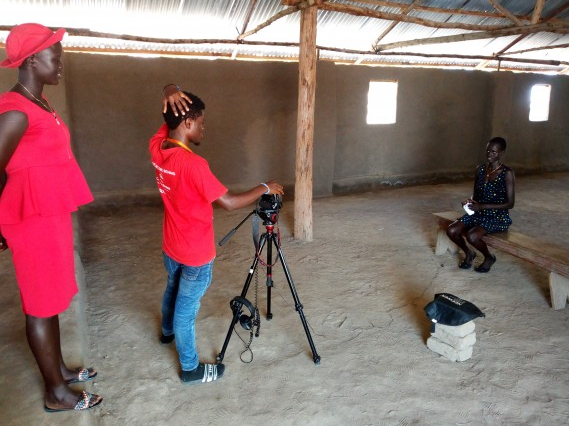
CineLab provides a 6 month training course, giving the students hands-on experience, which will enable them to either become entrepreneurs and start their own business, or seek employment in the industry.
They generate income through developing video projects for advertising, public service announcements, and short documentaries. I am currently collaborating with CineLab Akademie in preparing a video highlighting the benefits of investing in Uganda.
SYDF Is tackling the problem of youth unemployment in Uganda by training youth in tailoring, hairdressing, soap making, baking, paper bag making and making reusable sanitary pads.

Sustainable Youth Development Foundation (SYDF) trains youth in tailoring, hairdressing, soap making, baking, paper bag making and making reusable sanitary pads
Since its founding by Dixon Aine in 2015, SYDF has trained over 4,000 youth in various skills at its center and has presented to over 10,000 students at various schools throughout Uganda. Students pay fees ranging from 50,000UGX (approx. $15 USD) for a one-week course in the simpler skills (soap making, bag making etc.), and 350,000 UGX (approx. $100 USD) for a three-month program in more skilled trades such as baking and tailoring. Most of the students are from urban slum areas. Once a course is completed, students are encouraged to start their own businesses using their newly learned skills. Some of the graduates have been hired by SYDF as instructors, while many others have successfully started their own businesses serving their communities.
Lobo Global Impact has provided SYDF with a low interest rate loan of 3,000,000 UGX ($850 USD) to purchase sewing machines and sewing supplies for its new training center in Mpererwe, Kampala, Uganda.
The Uganda water Project’s goal is to help end Uganda’s water crisis once and for all by building infrastructure that relieves immediate water insecurity today, developing sustainable enterprises that keep clean water flowing tomorrow, then advocating for national systems that ensure it stays that way forever.

Rainwater Collection
A Uganda Water Project rainwater collection system consists of a 10,000-liter polyethylene tank that’s placed on a cement base and connected to a building’s metal roof through a gutter system. As rainwater is harvested, people can collect it from the nearby tap stand we install, then purify it using the four hollow fiber membrane water filters AquaTrust includes with each of the rainwater collection systems.
COST: $3,600 USD
Borehole Well Rehabilitation
A borehole well is a simple hand pump well that typically ranges from 100 ft. to 250 ft. deep. Even though this pumping system is the most common method of water delivery across Africa, the wells include so many moving parts and endure so much wear and tear that many break down after only a few years of regular use. By bringing in a crew to disassemble the well, upgrade its hardware, repair what’s broken, and train community members to maintain it, Uganda Water Project and AquaTrust are able to bring these wells back to life and prevent similar problems from occurring in the future.
COST: $2,000 USD
Borehole Drilling
In communities where dependable water sources are scarce, drilling a new borehole well is often the best way to provide safe and reliable drinking water. By tapping into groundwater that is trapped in aquifers often hundreds of feet below the earth’s surface, drilling a new borehole well is a higher risk, high-reward project that can provide years of abundant water to entire communities.
COST: $8,000-12,000 USD
AquaTrust
AquaTrust is a borehole maintenance subscription service. When a community subscribes to & honors one fixed monthly payment (approximately $1 USD per month per family), Aqua Trust will do everything in our power to prevent their well from breaking down. If there are any problems, Aqua Trust will fix the problem at no additional cost to them.
COST: $2,000 USD for the initial well rehabilitation; maintance subscription costs calculated for and paid by community on a per household basis
All construction materials for the initial borehole well upgrade and annual overhauls are sourced in Uganda and installed by Uganda Water Project's Ugandan crew. Ongoing borehole well mainteance and services are performed by AquaTrust and Uganda Water Project’s social enterprise, Red Rhino Development.
GiveLove works hands-on with schools, communities, and Non-Governmental Organizations to provide affordable toilets and on-site treatment solutions for high-need and water-scarce areas, like the Kamwokya Slums in north eastern Kampala

GiveLove provides compost toilets (which is a box, with a toilet seat on top, and an area in the box for a bucket. Residents use the toilets and throw sawdust in the bucket once finished to kill the smell and prevent attracting flies. GiveLove picks up the buckets and mixes the human waste with agricultural waste, food scraps, and dead animal carcasses to create a fertilizer. The waste takes about 8 months to compost into fertilizer. SEAS uses the compost to create fertilizer pellets which are then sold to farmers. The fertilizer really shows dramatic results when compared to planting without the fertilizer.

Through their collaborative efforts, GiveLove and SEAS provide proper sanitary toilets in an area in dire need of it, properly dispose of the human waste, and provide effective fertilizers to small hold farmers which help increase their crop yields
Give Love Offices in the Kamwokya Slums, Kampala, Uganda

Each Year, MiAgro Shoppers, one of the young entrepreneurs I work with in Uganda, organizes a girls soccer tournament as their Corporate Social Responsibility Project. The Tournament uses soccer as a platform to promote girls' education by tackling absenteeism and dropouts. Because of the comradery, self confidence, enjoyment and pride the girls get from representing their school playing football, we believe that the girls will want to attend and stay in school. The Tournament funds scholarships for the girls and post-tournament workshops in sexual reproductive health, leadership, financial literacy, and, entrepreneurship skills. The 2023 tournament will include primary schools from Kiboga and Kyankwanzi Districts in Uganda, with over 200 schools and close to 5,000 participating girls. We are looking for donations to cover transportation costs, equipment costs, tournament prizes and to fund the post-tournament workshops. One hundred percent of your donations go to tournament activities.
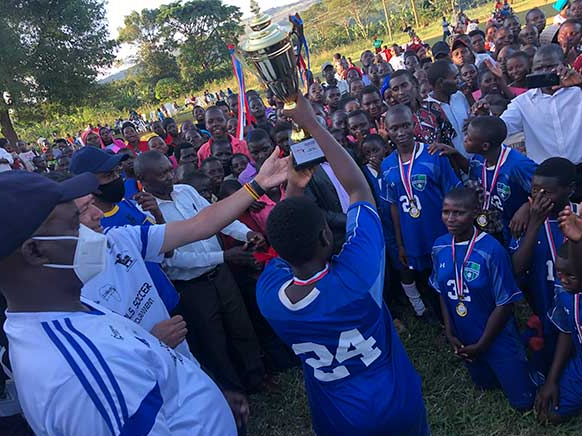
Why a Girls Football Tournament?
Girls need to have the same access to education as boys. Although the number of girls enrolled at the foundation level classes in rural Uganda equal that of boys, as the children grow older, the number of girls attending school decline steadily. Even with the introduction of free universal primary education, the number of girls graduating from primary school remains very low. The United Nations Girls' Education Initiative (UNGEI) reported that more than 700,000 girls in Uganda between the ages of 6 to 12 have never attended school and around half of the girls between the ages of 15 to 24 are illiterate. Four out of five girls do not attend high school.
One major factor contributing to the low female school attendance and literacy rates is that up to 40% of girls in Uganda are married before the age of 18. Around 10% of girls are married before the age of 15. As a result 35% of girls drop out of school due to marriage and 23% drop out due to pregnancy. In Uganda, teenage pregnancy rates are some of the highest in the world, the national average is 24%.
In addition, though education is free, school supplies and uniforms are not and because of this, when faced with a choice to either send a son or a daughter to school, a son's education will usually be prioritized. Furthermore, the Global Partnership for Education reported that especially in rural areas, local traditions dictate that girl can be married in exchange for dowry. Thus many families look at the potential short term income from dowry, rather than the lifetime of benefits that a well educated, confident and skilled daughter can provide the family.
With the Covid-19 pandemic and related restrictions in Uganda over the last 2 years at least 1.2 million learners have been driven out of school which has further hindered efforts at promoting girls education. If we do not do something, most of these girls will not return to school and thus set us further back in our efforts to educate Uganda's rural young girls.
With the 2021 Tournament Organizers

Impact From Past Tournaments.
This is the fourth edition of the MiAgro Shoppers Girls Soccer Tournament. The prior 3 editions of the Tournament were held in Kiboga district and covered 95 schools with 2,567 girls participating. MiAgro and its partners followed up the tournaments with post-tournament activities and training to keep the girls engaged in various schools throughout Kiboga district.
Through it’s post-tournament work, MiAgro has:
1. Provided over 200 Girls with leadership training, Sexual Reproductive Health training and follow up. The trainings will increase access and utilization of friendly and age-appropriate sexual reproductive health services among adolescent girls and young women. They also address different social and cultural behaviors that puts girls at risk, including, menstruation myths, child marriage, teenage pregnancy that affects the growth and development of the girl child.
2. Formed 4 youth savers clubs,
3. Trained 12 peer educators,
4. Created 8 social impact investments,
5. 148 girls were trained in making reusable sanitary pads,
6. 143 girls were trained in cottage skills, and
7. 5 girls received scholarships covering their whole education career through one of our sponsors Finding XY
8. Sensitized the communities about the importance of girl’s education.
Post Tournament Training Classes

Our Goal for the 2023 Tournament
Participation in the 2023 MiAgro Girls Soccer Tournament is available to primary school teams within the Kiboga and Kyankwanzi districts. There is an initial commitment fee of 30,000 UGX for each school. This fee helps with the administrative costs of running the tournament.
Each participating school will be requested to form a group of at least 25 girls to participate in the program. In total, we expect 200 schools and over 5,000 girls to participate in the tournament. These girls will be trained not only in football, but will participate in after school activities provided by our partner organizations. The activities during the tournament period include:
1. A soccer tournament between the participating schools, which will run from mid February to mid March 2023.
2. Post tournament activities that target the top 16 schools. Participants will be trained in areas of Sexual Reproductive Health; hand skills and financial literacy and these trainings will go on until the girls graduate.
3. A football academy for the top players selected during the tournament.
By the end of this 4th edition we intend to achieve the following;
- Enroll 200 schools in Kiboga, Kyankwanzi.
- Involve 5000 girls into the tournament.
- Enrolls 400 girls (16 schools) into post tournament activities.
- Form 16 junior savers clubs.
- Enroll 40 girls for primary school academic scholarships.
Although there are many people, including the staff of MiAgro Shoppers, school teachers and community members who volunteer their time to facilitate the tournament, there are a number of expenses that rely on the generosity of sponsors and donors. Lobo Global Impact has been a proud sponsor of the 2021 and 2022 Tournament, and will remain actively involved in future events. The Tournament runs from February through March each year, and is a fun event to plan a trip around. If you would like to support the 2023 MiAgro Girls Soccer Tournament, please email me at loboglobalimpact@gmail.com, or donate to our GoFundMe Page
GoFundMe Page - MiAgro Girls Soccer Tournament

Miagro shoppers' is an e-commerce digital shopping platform based in Kampala-Uganda with supporting logistics offering a range of products from agricultural products, groceries, wines, spirits, and kitchenware delivered to your doorstep.
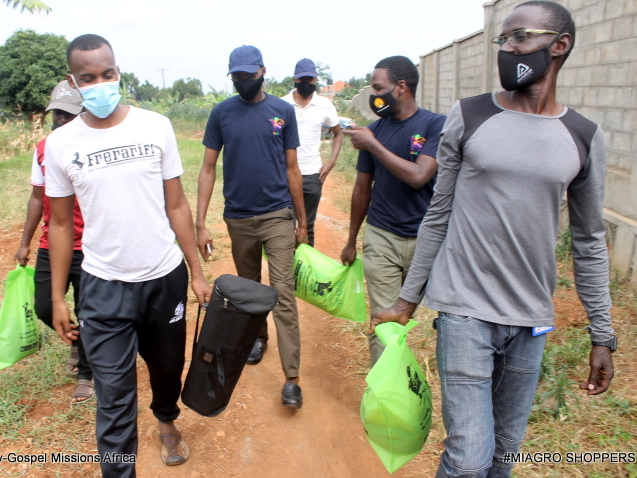
One of the main goals of MiAgro is to link farmers directly to customers in a manner that ensures farmers receive fair prices for their products. The company is still in its early stages of building a customer base to support farmers. It currently supplies a number of local hotels, small markets, and residential customers with everything they need for their kitchen.
Click/Tap on this link to view Miagro shoppers e-commerce platform
Nuestros Pasos is an organization run solely by volunteers, who provide tuition assistance, books, school supplies, and uniforms to students in he tiny village of Mano De Leon, Guatemala. Most of the expenses are paid for by the volunteers and their friends.
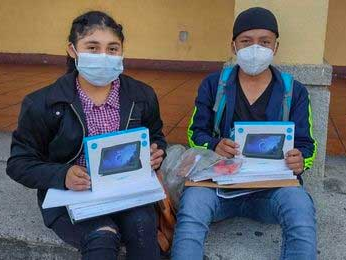
In addition to the financial support, Nuestros Pasos, through its volunteers, provides tutoring in math, science, language, English, accounting and any other subjects as needed in Mano De Leon every Saturday to help the students succeed in School. Visiting the village with “Profe” Bryan Gonzalez, I could see the impact Bryan had on not only the scholarship students, but on the entire village.

